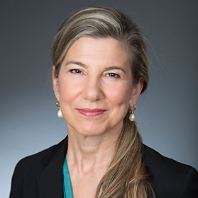As part of our preparation for our upcoming Milk | Mood | Moves conference, we are highlighting a few of our speakers. First up: Dr. Catherine Monk!
Dr. Catherine Monk fell into the psychology field by first studying journalism. She realized that what she loved in the journalism field was hearing people’s stories and it was this first love that led her to become not only a Professor of Medical Psychology in the Departments of Obstetrics & Gynecology and Psychiatry at Columbia University but also the founding director of a novel initiative that embeds mental health services into the OB/GYN clinic. Patients of all ages and backgrounds are referred to the integrated and insurance-covered mental health services by their OB/GYN providers and through universal depression screenings. The providing of mental health services is part of an effort to provide “whole person” care by examining the health of the person outside of only the traditionally considered biomedical indicators. While this shift is not new, it is still relatively unique in the OB/GYN field. It is more commonly seen in pediatric clinics, according to Dr. Monk.
The COVID-19 pandemic has accelerated the move to long distance medicine: During the COVID-19 pandemic, the mental health services offered in the OB/GYN clinic have been offered through telemedicine instead of in-person. While there are some cons of this acceleration to care over the internet, according to Dr. Monk, the convenience alone outweighs the cons. Another benefit in addition to convenience for patients, is accessibility of services. She expects more pregnant and postpartum people will receive mental health services after the pandemic. While this may change as state laws are tightening regarding provider licensure after being relaxed during the height of the pandemic, Dr. Monk still thinks more people will still be able to access mental health services with telemedicine. The pandemic has also made a cultural shift towards acceptance of mental health care, said Dr. Monk.
In addition to clinical work, Dr. Monk leads a research lab, Perinatal Pathways, that investigates how influences on the fetus can affect the health of the child throughout development. The lab currently has multiple ongoing projects that have continued throughout the pandemic with the use of videotaping, zoom sessions and other web-based systems with minimal bio data collection. Dr. Monk’s lab is a part of the COVID-19 Mother Baby Outcome (COMBO) initiative, a group of scientists at Columbia that “follows SARS-CoV-2 exposed laboring mothers and their newborns and compare their long- term health outcomes to case-matched dyads without prenatal exposure.” The hypothesis of this study is “that prenatal SARS-CoV-2 exposure affects (1) mother and (2) child brain and behavior, and (3) demonstrate that the socioemotional health of each member of the mother- child dyad is intrinsically related to that of the other.” Monk credits her lab colleagues for their energy and ability to pivot during the pandemic to continue the lab’s ongoing studies and participate in COVID-related investigations.
All of Dr. Monk’s work, both in the clinic and in the lab, indicates that the transition into parenthood is an important biological and psychological one, like adolescence, and that support is crucial to the success of the parents and the child.
To learn more about Dr. Monk’s work, register for Milk | Mood | Moves, an interdisciplinary conference on September 23-24, 2021 for health professionals, researchers, and advocates to share the latest science and clinical knowledge of pregnancy, birth, and postpartum, focusing on human milk and lactation, perinatal mood disorders, and physiology and biomechanics of the perinatal period.
